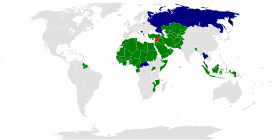Organisation of Islamic Conference
|
Organisation of Islamic Cooperation |
|
|---|---|
|
|
|

Member states
Observer states
Suspended states
|
|
| Administrative centre (Headquarters) | |
| Official languages | |
| Type | Religious |
| Membership | 57 member states |
| Leaders | |
|
• Secretary-General
|
Yousef Al-Othaimeen |
| Establishment | |
|
• Charter signed
|
25 September 1969 |
| Population | |
|
• 2011 estimate
|
1.6 billion |
| GDP (PPP) | estimate |
|
• Total
|
18.6 trillion |
|
• Per capita
|
$10,825 |
|
Website
www.oic-oci.org |
|
The Organisation of Islamic Cooperation (The OIC; Arabic: منظمة التعاون الإسلامي; French: Organisation de la Coopération Islamique) is an international organization founded in 1969, consisting of 57 member states, with a collective population of over 1.6 billion as of 2008. The organisation states that it is "the collective voice of the Muslim world" and works to "safeguard and protect the interests of the Muslim world in the spirit of promoting international peace and harmony".
The OIC has permanent delegations to the United Nations and the European Union. The official languages of the OIC are Arabic, English, and French.
Since the 19th century, some Muslims had aspired to ummah to serve their common political, economic, and social interests. The collapse of the Ottoman Empire and the Caliphate after World War I left a vacuum for a pan-Islamic institution. The al-Aqsa fire is regarded as one of the catalysts for the formation of the Organisation of the Islamic Conference (OIC, now the Organisation of Islamic Cooperation) in 1972. Leaders of Muslim nations met in Rabat to establish the OIC on 25 September 1969.
According to its charter, the OIC aims to preserve Islamic social and economic values; promote solidarity amongst member states; increase cooperation in social, economic, cultural, scientific, and political areas; uphold international peace and security; and advance education, particularly in the fields of science and technology.
The emblem of the OIC (shown above) contains three main elements that reflect its vision and mission as incorporated in its new Charter. These elements are: the Kaaba, the Globe, and the Crescent.
On 5 August 1990, 45 foreign ministers of the OIC adopted the Cairo Declaration on Human Rights in Islam to serve as a guidance for the member states in the matters of human rights in as much as they are compatible with the Sharia, or Quranic Law.
...
Wikipedia


